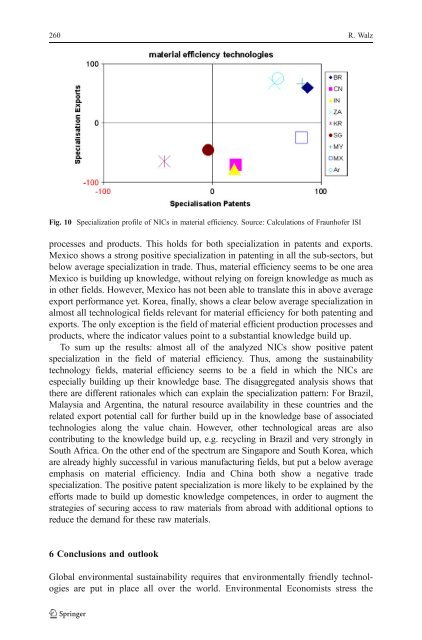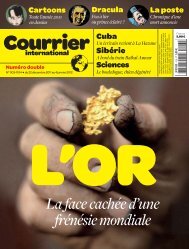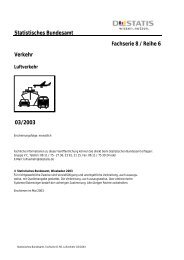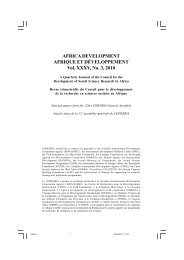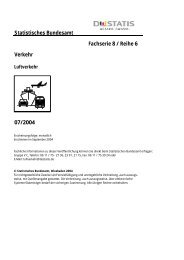The international economics of resources and resource ... - Index of
The international economics of resources and resource ... - Index of
The international economics of resources and resource ... - Index of
You also want an ePaper? Increase the reach of your titles
YUMPU automatically turns print PDFs into web optimized ePapers that Google loves.
260 R. Walz<br />
Fig. 10 Specialization pr<strong>of</strong>ile <strong>of</strong> NICs in material efficiency. Source: Calculations <strong>of</strong> Fraunh<strong>of</strong>er ISI<br />
processes <strong>and</strong> products. This holds for both specialization in patents <strong>and</strong> exports.<br />
Mexico shows a strong positive specialization in patenting in all the sub-sectors, but<br />
below average specialization in trade. Thus, material efficiency seems to be one area<br />
Mexico is building up knowledge, without relying on foreign knowledge as much as<br />
in other fields. However, Mexico has not been able to translate this in above average<br />
export performance yet. Korea, finally, shows a clear below average specialization in<br />
almost all technological fields relevant for material efficiency for both patenting <strong>and</strong><br />
exports. <strong>The</strong> only exception is the field <strong>of</strong> material efficient production processes <strong>and</strong><br />
products, where the indicator values point to a substantial knowledge build up.<br />
To sum up the results: almost all <strong>of</strong> the analyzed NICs show positive patent<br />
specialization in the field <strong>of</strong> material efficiency. Thus, among the sustainability<br />
technology fields, material efficiency seems to be a field in which the NICs are<br />
especially building up their knowledge base. <strong>The</strong> disaggregated analysis shows that<br />
there are different rationales which can explain the specialization pattern: For Brazil,<br />
Malaysia <strong>and</strong> Argentina, the natural <strong>resource</strong> availability in these countries <strong>and</strong> the<br />
related export potential call for further build up in the knowledge base <strong>of</strong> associated<br />
technologies along the value chain. However, other technological areas are also<br />
contributing to the knowledge build up, e.g. recycling in Brazil <strong>and</strong> very strongly in<br />
South Africa. On the other end <strong>of</strong> the spectrum are Singapore <strong>and</strong> South Korea, which<br />
are already highly successful in various manufacturing fields, but put a below average<br />
emphasis on material efficiency. India <strong>and</strong> China both show a negative trade<br />
specialization. <strong>The</strong> positive patent specialization is more likely to be explained by the<br />
efforts made to build up domestic knowledge competences, in order to augment the<br />
strategies <strong>of</strong> securing access to raw materials from abroad with additional options to<br />
reduce the dem<strong>and</strong> for these raw materials.<br />
6 Conclusions <strong>and</strong> outlook<br />
Global environmental sustainability requires that environmentally friendly technologies<br />
are put in place all over the world. Environmental Economists stress the


